According to Wikipedia, long-distance relationships (LDRs) are intimate relationships between partners who live more than 100 miles apart from each other. These couples can be engaged with each other, married, or completely new couples who met on the internet and never saw each other in person.
It doesn’t really matter how they met and what the exact status of their relationship is as long as they’re committed to each other and share the same relationship goals.
When we first think about a long-distance relationship, we oftentimes wonder if it’s even doable. We think to ourselves, “Do long-distance relationships work? Do they fail? What makes them so difficult? Is it the lack of physical touch or the problems that the distance magnifies?”
If you’re asking yourself these questions, you need to know that long-distance relationships work just like normal relationships.
As a matter of fact, they oftentimes work even better because couples take the time to get to know each other first and build a strong foundation based on love, care, and respect.
This is especially true for couples who meet each other online through forums, social media, apps, or games.
Such couples first learn to respect each other and accept each other’s flaws before they even consider meeting in person and living together. Patience essentially allows them to see the person they’re dating for who he or she is.
You might find it interesting that online couples are the only couples who go through 2 infatuation phases. The first phase occurs when they meet online and the second when they meet in person.
But we’ll talk more about that some other time.
Today, we’re going to talk about the positives and the negatives of a long-distance relationship and discuss whether long-distance relationships are even worth it.
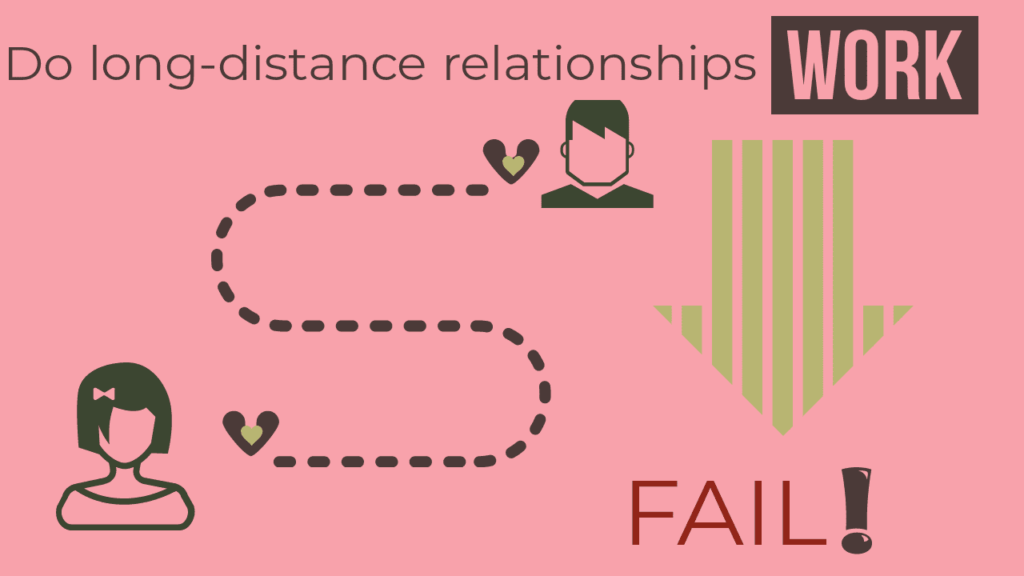

Why long-distance relationships don’t work?
You might have friends who are in an LDR or perhaps you’re (getting) in one yourself—and you’re thinking if long-distance relationships work.
I’d like to start by saying that long-distance relationships aren’t suitable for everyone.
They’re not great for people who don’t respect them. And they certainly aren’t great for those who don’t possess the personal strength to stay committed through good and bad.
I want to emphasize the bad because bad experiences in relationships almost always determine their success. If couples can’t learn to deal with the negative aspects of a relationship such as misunderstandings and false perceptions, they probably aren’t going to stay together forever.
They’ll most likely go separate ways the moment they develop negative feelings for each other.
This is why long-distance relationships require extremely good communication. In all fairness, all relationships do, but LDRs especially need the communication to be excellent because the most important part of the relationship consists of it.
Communication in long-distance relationships essentially makes up for the lack of physical contact.
So if you got involved with a man or woman and you don’t see him or her very often, make sure that you communicate frequently and lovingly.
I can’t say how much you should talk every day because each person has different wants and needs, but in my opinion, you should talk, text, or video call at least an hour a day.
This is something you should talk to your partner about.
Take long-distance relationships seriously!
From what I see, a lot of people out there don’t take long-distance relationships seriously. They consider them to be backup plans or temporary relationships until they find something more tangible and suitable for their needs.
Something more “real.”
But the truth is that long-distance relationships are real. They are as real as normal relationships because couples in these relationships feel the exact same emotions as those in physical relationships.
The only difference between long-distance relationships and regular relationships is that couples in LDRs can’t make use of physical intimacy, such as hugs and kisses to solve misunderstandings and challenging situations.
They can only use texts, calls, and video calls—and hope for the best that their partner interprets their thoughts, words, and actions in the right way.
This is one of the biggest downsides to a long-distance relationship.
If couples lack maturity and the ability to solve misunderstandings and arguments quickly and efficiently, they likely won’t be able to strengthen their relationship and stay in it.
On the contrary, they will probably start to resent each other and eventually (when they see more negatives than positives) go separate ways.
You need to understand that romantic relationships usually start out really well. Couples feel elated with each other and see only the best of the best in each other.
But once they stop looking at their relationship through rose-tinted glasses and perceive their relationship for what it is, something interesting happens.
They are immediately forced to take a test.
A test that determines whether they possess the power and the ability to handle disagreements, arguments, differences, and each others’ flaws in a mature, healthy manner.
Some people enter a long-term relationship mainly for the sake of being in one. Such people do this to extort the benefits of a long-distance relationship (the emotional and sexual parts) and to feel ecstatic as long as the relationship is new and working great.
But when it stops working great and no longer makes them feel great, things quickly take a turn for the worse. People who enter a relationship for the wrong reasons then become impatient with their partner and lose respect for him or her.
As a result, they lose the will to fight.
This usually occurs 4-6 months into a (long-distance) relationship because that’s when people normally stop pretending to be someone they’re not and show their true colors.
What makes long-distance relationships difficult?
Long-distance relationships are just like normal relationships. They require love, care, understanding, communication, patience, gratitude, a life outside of the relationship, decent moral values, and an iron will to stay committed.
If couples lack the traits above, the unfortunate truth is that they don’t have what it takes to be in a long-term relationship. They can’t remain loyal to it (at least not very long) because they are continuously at risk of forgetting what makes their relationship special.
That’s why you need to know that couples who lack:
- Gratitude: drift apart
- Moral values: lie, manipulate, cheat, or monkey-branch
- Patience and understanding: misunderstand each other, quarrel, bicker, and develop resentment
- Personal goals and ambitions: lose respect and take each other for granted
- Maturity: deliberately or indeliberately hurt each other
- Willpower: give up on the relationship when challenges arise
If couples can become aware of these important personal characteristics beforehand and eagerly work on their lackings, couples can almost effortlessly stay in love. They can flourish their relationship and make it stronger each and every day.
But first, they have to understand that long-distance relationships are just as important as other relationships and that if they haven’t done the work on themselves that they likely won’t get much work done on the relationship either.
They’ll treat it the way they treat themselves and leave their relationship completely up to fate.
As you may have noticed by now, long-distance relationships don’t fail because couples are incompatible by nature. They fail because couples don’t develop the ability to understand themselves and each other.
Let that sink in for a while.
Unmet expectations
Some couples experience such difficulties in a relationship that they argue and push-pull the relationship. By doing so, they greatly disturb the balance in the relationship and make one person chase after the other.
Generally speaking, the person who chases is usually the one who is hurt more.
A good example of unmet expectations in a long-term relationship is when a person refuses to communicate and meet his or her partner’s basic relationship expectations.
That’s how the uncaring person starves his or her partner for love and recognition—and brings out his or her worst fears. Fears that incite pushy, needy, demanding, or clingy behavior.
Another example of miscommunication and unmet expectations is when long-distance couples reside in different areas of the world.
Such couples underwent completely different upbringings, meaning that they are that much more susceptible to cultural and religious misunderstandings and disagreements.
If they can’t find a way to resolve their issues fast enough, their differences can lead to a cultural differences breakup.
The benefits of a long-distance relationship
First of all, long-term relationships aren’t any easier than normal relationships.
If a couple doesn’t get along from a distance, the couple isn’t going to get along in person either. Maybe they won’t argue about the same problems, but they’ll nonetheless argue in the exact same way.
And that’s because people are creatures of habit. When we’re stressed and feel hurt, we behave the way we’re used to behaving – the way we’ve always behaved.
So don’t expect long-term relationships to be any easier than physical relationships.
If you have issues in your LDR and you’re not too happy with your relationship, don’t think that everything will turn out great merely by cutting the distance.
It most likely won’t because the distance itself isn’t the problem in your relationship. It’s the way you and your partner handle trivial as well as important matters.
With that in mind, let’s now talk about the positive aspects of a long-term relationshp.
The most notable positive trait of a long-distance relationship is that you have a lot more freedom than in a regular relationship. You basically get to decide how you spend your days and who you spend them with.
Having this independence can feel great at times.
But this doesn’t mean that you can neglect your partner and get away with whatever you want. Your partner is still your partner and won’t approve of your behavior if you refuse to communicate properly and hang out with members of the opposite sex (or the same) all day, every day.
All freedom in a long-distance relationship means is that you live more independently and that you can prioritize your wants and needs a bit more than if your partner was right there next to you.
At the end of the day, you still have certain relationship expectations to fulfill. Expectations such as talking to your partner and contributing to the relationship in whichever way necessary.
Another benefit of a long-distance relationship is the emotional, non-physical bond you develop with your partner through many months of sharing information and planning the future.
You can get incredibly close.
Especially when you eventually cut the distance and mix the emotional bond with the physical one. That’s when your relationship can turn into something magnificent.
The last benefit of a long-distance relationship I can think of is that you get to see how good your partner’s communication, listening, and problem-solving skills are.
If they’re good, you can be certain that your partner (of 6 months or more) is going to handle difficulties in the physical relationship the exact same way as in the long-distance relationship.
And that’s because your partner’s characteristics are what they are.
So if you’re in a long-term relationship and you want to make make your LDR work, treat your partner with respect. Show him or her that you’re committed and that you have the relationship skills to maintain a long-distance relationship.
Here’s a recap of the benefits of a long-distance relationship.
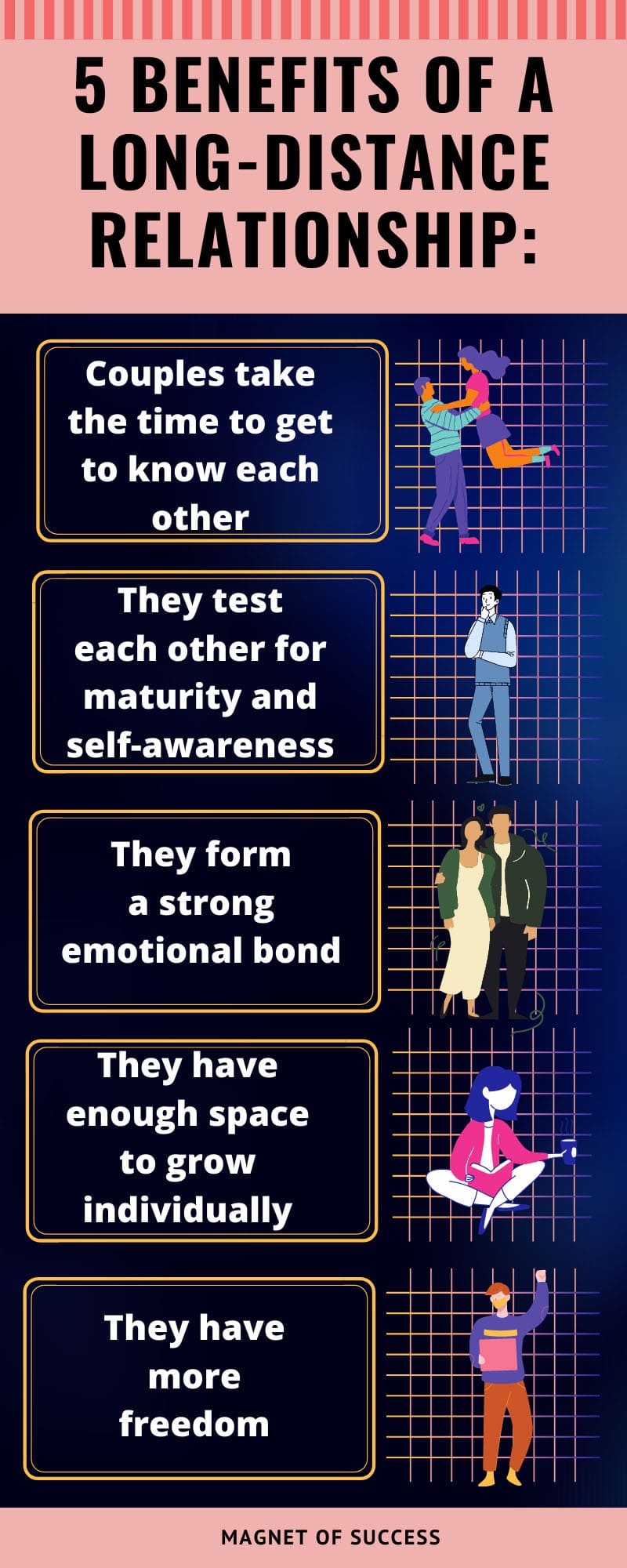

Do long-distance relationships work?
According to research, about 80% of relationships fail. This includes long-distance relationships, physical relationships, interracial, same-sex relationships, and every kind of relationship you can think of.
The reason they fail so often is simpler than you may think. People just aren’t ready for one. They either lack in the personal development department and treat their relationship poorly or they simply aren’t emotionally ready.
Some people suffer from trust issues caused by the end of their previous relationship—while others, enter a long-distance relationship to gratify their emotional and sexual needs.
This is why only the mature, self-aware, and emotionally ready people with deep relationship knowledge and high personal values actually make their long-distance relationship work.
They make it work because they genuinely want to make it work. It’s that simple.
If only everyone was that determined. Then the percentage of people who break up would definitely be far below 80%. So would the percentage of couples who end up in a divorce.
In the western world, this number seems to fluctuate at around 40%.
Below is an image showing when long-distance relationships actually work.
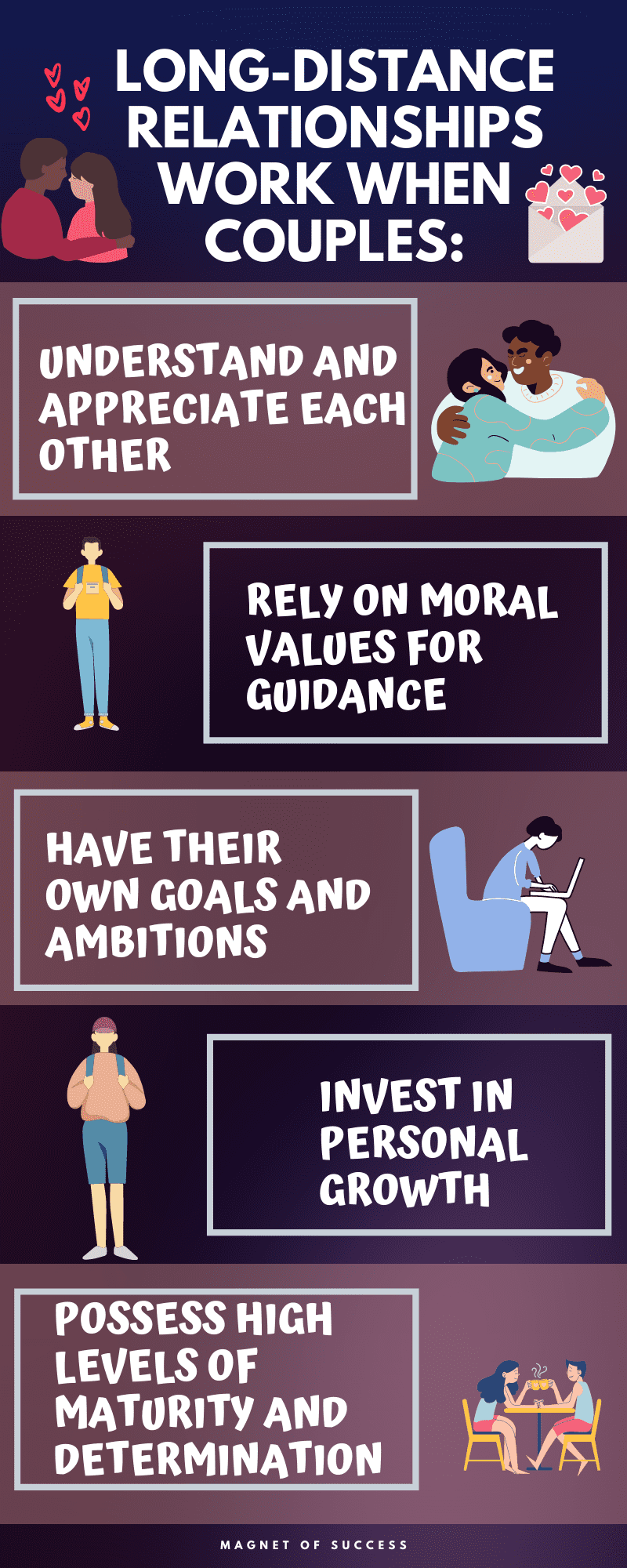

The truth is that there’s an abundance of people out there who aren’t fit to be in a long-distance relationship. But for some reason, they still continue to date and refuse to change.
Personally speaking, I don’t call their relationships successful. I call them ticking time bombs because they are relationships that are waiting for something disastrous to break them apart.
Throughout my life, I’ve observed many couples struggle in a long-distance relationship. Some worked on themselves and overcame their differences, but most didn’t because they didn’t see a reason to look inward and strive to become the best version of themselves.
Needless to say, most LDR couples I know failed to understand the fundamentals of a romantic relationship—and as a result, failed to meet each other’s basic relationship needs.
I sincerely hope that they’ve learned their lessons after their LDR breakup.
Some LDR couples also kill their relationship because they overthink things. They worry about the future and how they’re going to start living together when they should be enjoying the moment and continuing to bond.
As the saying goes, when there’s a will, there’s a way. So make sure to develop the willpower and the ability to persevere through uncertainty and doubts.
Do you think that long-distance relationships work? Have you ever been in one? Post your experiences below this article.

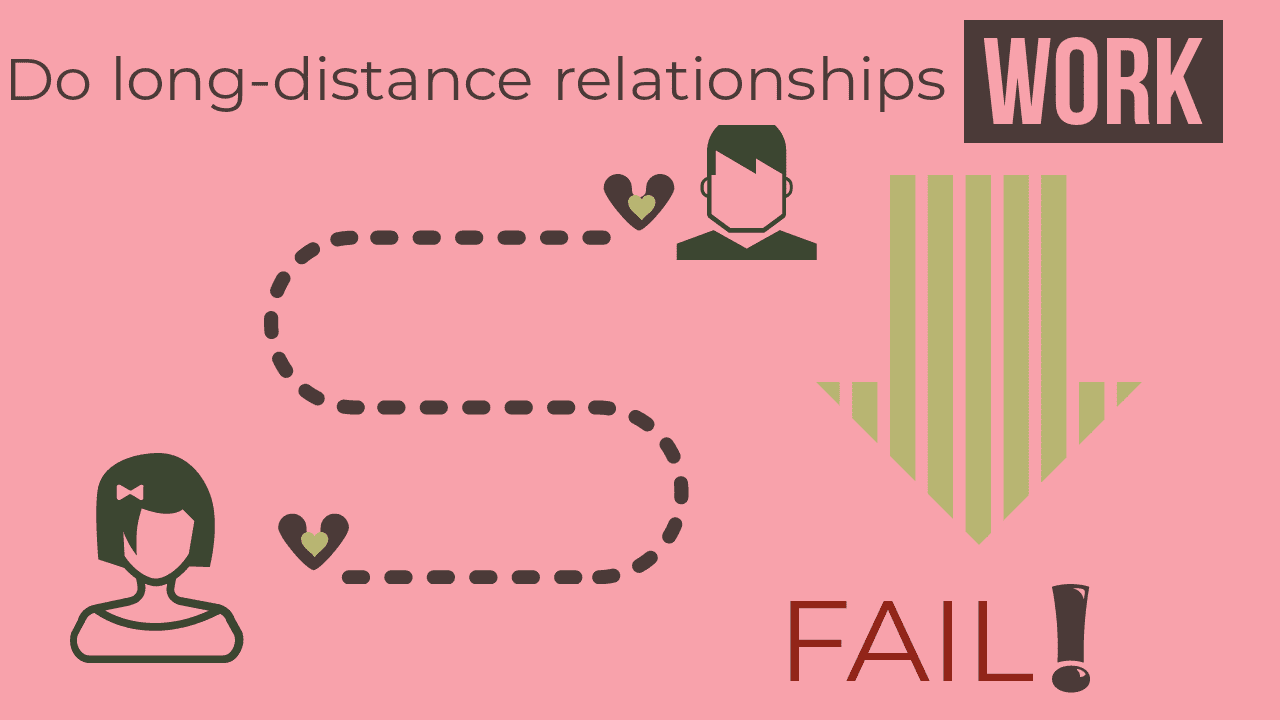
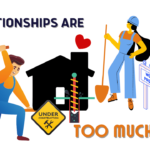


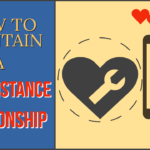
Hi. I’m 60 yrs of age and love the article btw. Am extremely keen to try this method. My ex parted company 4 months ago after 5 yrs of which we never had a single fight in our time together. The biggest hurdle I’m finding with the letting go first process is that the break up occurred in the middle of lockdowns and it happened overnight without even facing each other so I was suddenly in a situation where I not only lost my partner, but also lost all my activities/outlets from everything closing and was stuck at home 7 days a week for months with only walking/exercise and food shopping to do. Am convinced that a r/ship break up during these times is far worse than a break up during normal times. I moved to the country town we’re in just a few yrs ago with my brother and mum to be in the same town as my partner so the only friends I’ve made are the people introduced to me by my partner and I’ve lost all contact with them as it’s inappropriate to have contact with them now so in a position of having no friends or outlets, being at home most of the time thus making it easier to focus on my loss. Still love my ex dearly and we’ve both come from a background of many r/ships losses. We are 2 lost people. Stay safe everyone.
this is really nice.. for those who manages to stay faithful and loyal during LDR have higher chance of avoiding cheating.. the cons would be physical presence.. when two different people are more expose to each other flaws, thats also where the challenge takes place.. but still doable.. if bothe are willing to compromise and adjust for the better.. nothing is imposible
What a great article.Thank you so much.
I had a ldr for about 5 years. 3rd Februray my boyfriend broke up with me. He just ended it via text without any explanation. I am still desperate and very hurt. I went NC immediately. He reached out for me after about 12 weeks of NC. We had a light but short conversation. After this I went NC again.
A week later he had birthday. I didn’t break NC for birthday wishes.
Since then we have had no contact anymore. 12 weeks now.
But in this weeks he sent me profile pics in the messenger we use. (3 times the last almost 2 weeks ago) The profile pics are not public. He has to sent them to my account ony then I can see them. That’s why I know they are aimed to me. I didn’t react, because it feels like breadcrumbs.
What would you do? Reach out to him?
I am so desperate. Please help!
K.
What a great piece of work! thanks Angelie for composing the article. LDR is hard, but physical one isn’t easier either.
Brilliant article! You describe my low value ex to a T!
Thank you DK.
I hope you enjoyed reading it as much as i loved writing it.
Sincerely,
Angelie
For me, only mature couples could withstand the LDR, for they need to have 3c’s; care, communication and commitment.
This article is very well-written!
Hi James.
I like your 3cs requirements. Never settle for less than you deserve.
Angelie
Thank you for this article! Very helpful for all of us
Thank you for reading Linda! I hope it helps.